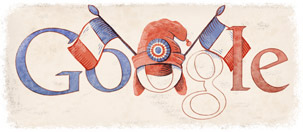Google’s Eric Schmidt Seeks Rapprochement With French Over Proposed Newspaper-Linking Tax
Earlier this month Google, which past French president Jacques Chirac once called an agent of “Anglo-Saxon cultural Imperialism,” threatened to stop linking to French news websites after French publishers and the French government floated a proposal to require the search engine to license their content. Current French President Francois Hollande’s government is essentially seeking to tax Google […]
 Earlier this month Google, which past French president Jacques Chirac once called an agent of “Anglo-Saxon cultural Imperialism,” threatened to stop linking to French news websites after French publishers and the French government floated a proposal to require the search engine to license their content.
Earlier this month Google, which past French president Jacques Chirac once called an agent of “Anglo-Saxon cultural Imperialism,” threatened to stop linking to French news websites after French publishers and the French government floated a proposal to require the search engine to license their content.
Current French President Francois Hollande’s government is essentially seeking to tax Google to help support or subsidize the country’s ailing newspaper industry. Google has vigorously opposed the notion of paying to index and link to news sites as a threat to the company’s “very existence.” Other European countries have considered or are considering similar ideas in an effort to prop up their own struggling newspaper industries.
Google defended itself by saying that it sends four billion clicks per month to French newspaper and media sites.
Now Google Executive Chairman Eric Schmidt is heading to Paris to meet with French government officials to try and resolve the matter before it further escalates. France technology minister Fleur Pellerin told The Atlantic’s new business publication Quartz that she hopes it can be resolved and cites the 2005 Agence France-Presse-Google licensing agreement as a potential model.
It’s not clear, however, in what way this notion is much different from what has otherwise been proposed: Google paying for newspaper content.
While the US has a much more “laissez faire” attitude about the plight of traditional media and the marketplace, the Europeans are more inclined to intervene to protect newspapers in particular. Google is targeted because of its centrality to the online experience, its deep pockets and the fact that many in Europe blame the company for the predicament of newspapers.
Accordingly the proposed “tax” acts as way to help newspapers and, almost equally, to “punish” Google for its success — though no one in France would ever admit that. Ultimately, however, neither side wants French newspaper sites to be de-indexed.
In a larger context this can be seen as merely the latest episode in the increasingly tense relationship between Google and Europe.
Contributing authors are invited to create content for Search Engine Land and are chosen for their expertise and contribution to the search community. Our contributors work under the oversight of the editorial staff and contributions are checked for quality and relevance to our readers. The opinions they express are their own.
Related stories
New on Search Engine Land